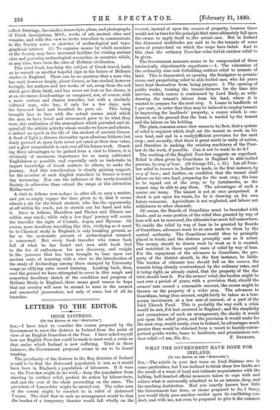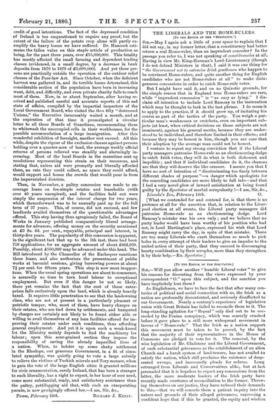WHAT THE GOVERNMENT HAVE DONE FOR IRELAND.
[TO THE EDITOR OF THE "SPECTATOR."] SIE,—The article in your last issue on Irish Distress errs in some particulars, but I am inclined to think these few faults are the result of a want of local and intimate acquaintance with the halting, half-hearted official measures taken to cope with and relieve what is universally admitted to be an intense, deep, and far-reaching destitution. Had you exactly known how little the Government has done, or seems prepared to do,! fancy, you would likely pass another verdict upon its vacillating con- duct, and with me, not even be prepared to give it the common credit of good intentions. The fact of the depressed condition of Ireland is too unquestioned to require any proof, but the extent of the failure of the potato crop alone will partly ex- emplify the heavy losses we have suffered. Dr. Hancock esti- mates the fallen value on this staple article of production as being, for the past three years, over £15,000,000. This fatality has mostly affected the small farming and dependent trading classes (evidenced, in a small degree, by a decrease in bank deposits from 1876 to 1879 of £3,699,000). And yet these per- sons are practically Outside the operation of the outdoor relief clauses of the Poor-law Act. Since October, when the deficient harvest was gathered in, and its terrible losses determined, this considerable section of the population have been in increasing want, debt, and difficulty, and even private charity fails to reach most of them. Now, in or about September, after having re- ceived and published careful and accurate reports of this sad state of affairs, compiled by the impartial inspectors of the Local Government Board, who visited the then fifty "distressed Unions," the Executive inexcusably waited a month, and at the expiration of that time it promulgated a circular letter to all these Boards of Guardians, recommending them -to whitewash the unoccupied cells in their workhouses, for the possible accommodation of a large immigration. After this wonderful exhibition of foresight, another rest ensued. All this -while, despite the rigour of the exclusion clauses against persons holding over a quarter-acre of land, the average weekly official returns of persons relieved was steadily and alarmingly in- creasing. Most of the local Boards in the meantime sent up resolutions representing this strain on their resources, and stating that, unless aid were promptly and, liberally afforded -them, no rate they could collect, no space they could afford, would support and house the crowds that would pour in from the impoverished districts.
Then, in November, a paltry concession was made to en- courage loans on fee-simple estates and leaseholds (with over 40 years unexpired), and the facilities held out were simply the suspension of the interest charge for two years, which thenceforward was to be annually paid up for the full term of 37 years. This, of course, did not succeed, and few landlords availed themselves of the questionable advantages offered. This step having thus egregiously failed, the Board of Works in January published comparatively liberal arrange- ments for advances, offering money on the security mentioned at £3 8s. 6d.. per cent., repayable, principal and interest, in thirty-five years. The popularity of this concession is apparent, in the significant fact that up to the 5th inst. there had been 759 applications, for an aggregate amount of about £462,939. Possibly, about £500,000 may be advanced under this head. The Bill introduced by the Chancellor of the Exchequer sanctions these loans, and also authorises the presentment of publie works at baronial sessions, giving borrowing powers at about 7+ per cent, for fifteen years. This step is now most inoppor- tune. When the usual spring operations are about to commence, is assuredly no time to turn local labour to exceptional employment. But even if this danger be not so likely, 'there yet remains the fact that the cost of these enter- prises falls exclusively upon the land, which is already heavily taxed. It requires little penetration to see that the landowning class, who are not at present in a particularly pleasant or patriotic temper, who, most of them, have heavy charges on their estates, who are tied down by settlements, and hampered by charges are certainly not likely to be found either able or willing to avail themselves of any loan facilities offered for im- proving their estates under such conditions, thus affording general employment. And yet it is upon such a weak-kneed lot the Ministry mainly depends to find the machinery for labour ; upon this sour-grained section they impose the responsibility of saving the already imperilled lives of a nation. When, to bolster up some shaky settlement In the Rhodope, our generous Government, in a fit of simu- lated sympathy, was quietly going to vote a large subsidy to relieve the victims of Turkish misrule and Tory menace, when to gain the vote of the large English cities it granted millions for civic ornamentation, surely Ireland, that has been a stranger to such liberality, has a right to expect, in her hour of sore need, some more substantial, ready, and satisfactory assistance than the paltry, pettifogging aid that, with such an exasperating parade, is now grudgingly offered her.—I am, Sir, &c.,



































 Previous page
Previous page